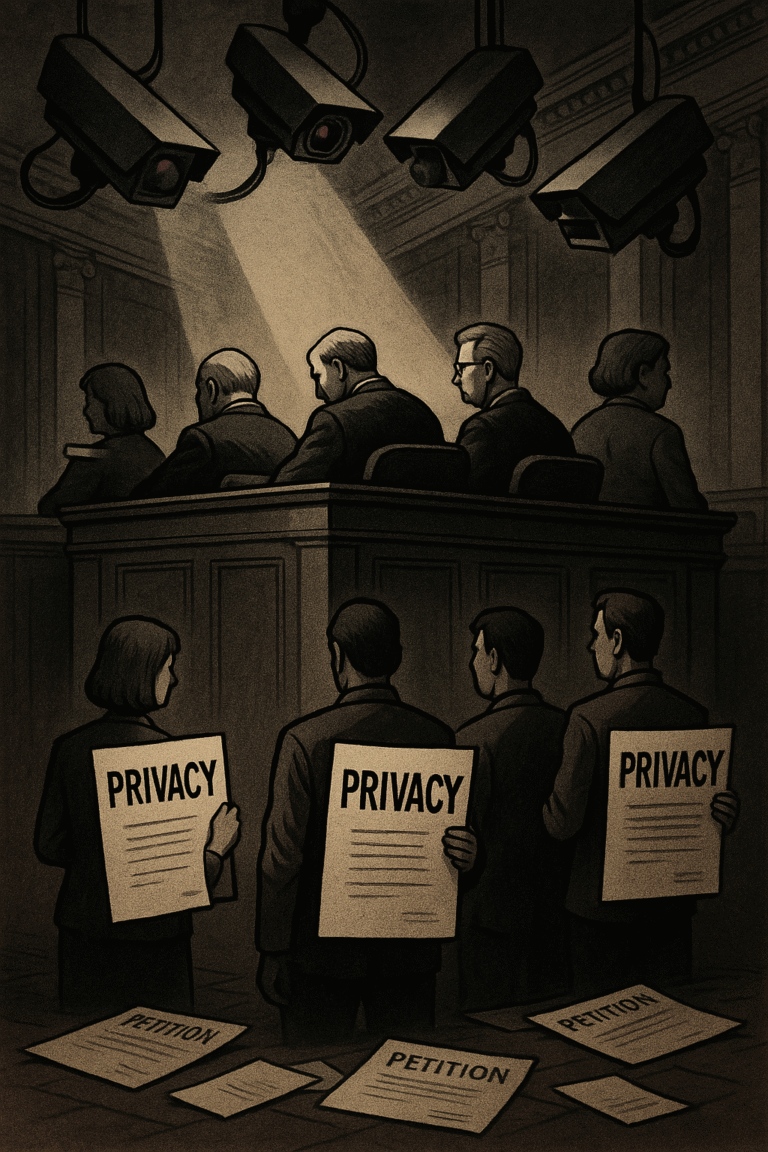Main Navigation Menu
© 2025 Tech Jacks Soutions, All Rights Reserved
© 2025 Tech Jacks Soutions, All Rights Reserved

Twitch has crossed the surveillance Rubicon. The Amazon-owned streaming platform now requires UK users to submit to facial recognition scanning before accessing mature content, transforming entertainment consumption into a biometric checkpoint.
This dystopian development represents gaming’s most brazen privacy invasion yet, wrapped in the hollow rhetoric of “child safety” while building the infrastructure for comprehensive digital surveillance.

Twitch has partnered with third-party vendor k-ID to manage the verification process Twitch introduces facial scan age verification for UK users | The Express Tribune, effectively outsourcing user surveillance to a Singapore-based startup founded in 2022. This arrangement exemplifies Silicon Valley’s favorite trick: laundering controversial practices through “independent” contractors to create plausible deniability.
The platform will utilize “k-ID,” a Singapore-based software company founded in 2023, which develops “age assurance” and compliance tools to help websites monitor their user base Age verification on Twitch: Everything you need to know.
The company markets itself as democratizing “age assurance,” but the reality is more sinister: k-ID represents the commercialization of biometric surveillance, packaging invasive technology as a compliance service.
k-ID’s technical implementation reveals the scope of data collection despite privacy marketing claims. Age Estimation – In some cases, we may use estimation technology, which analyzes specific signals associated with a user’s face (combined with liveliness checks) to make an educated guess about a user’s age without storing personal data How does k-ID verify my age? – k-ID. The “without storing personal data” claim is meaningless when the scanning process itself creates a permanent record of user compliance with surveillance demands.
The company’s funding sources expose the venture capital appetite for surveillance infrastructure. k-ID raised a total of $5.4 million across pre-seed and seed financing rounds last year. The pre-seed round was led by A16Z GAMES SPEEDRUN with the subsequent seed investment led by Konvoy with the participation of TIRTA Ventures Introducing k-ID: Groundbreaking Tech Powers Safe, Age-Appropriate Gaming for Kids and Teens, Supports Game Developer Compliance. Andreessen Horowitz’s investment confirms Silicon Valley’s commitment to normalizing biometric surveillance through gaming platforms.

The change, implemented on September 15, comes in response to stricter UK regulations for accessing mature online content Twitch introduces facial scan age verification for UK users | The Express Tribune.
The UK’s Online Safety Act serves as the legal pretext for this surveillance expansion, demonstrating how “child protection” legislation becomes the vehicle for comprehensive privacy destruction.
According to Ofcom, age verification checks can include facial recognition software, providing banking or credit card details, email-based age estimation, Photo ID scanning, or mobile network operator checks All the key facts about the UK’s new age verification legislation for adult sites. This menu of surveillance options reveals the Act’s true purpose: creating multiple pathways for identity verification that collectively build comprehensive user profiles.
The regulatory framework deliberately creates compliance pressure that forces platforms toward the most invasive verification methods. Pornography services must introduce age checks by July 2025 at latest Age checks to protect children online – Ofcom, establishing precedent that will inevitably expand to gaming and social media platforms.
Age verification impedes people’s ability to anonymously access information online Age verification requirements have landed in the UK – how the internet will change, and what about your privacy? | TechRadar, as Stanford researcher Riana Pfefferkorn observed. The Online Safety Act transforms anonymous internet access from a default right into a privilege requiring biometric surrender.

Twitch’s privacy assurances exemplify the sophisticated deception underlying modern surveillance systems. According to Twitch, the video selfies captured for the scans are processed entirely on the user’s device and are not stored or transmitted, a measure designed to address privacy concerns Twitch introduces facial scan age verification for UK users | The Express Tribune.
This “on-device processing” claim represents pure privacy theater. The fundamental privacy violation occurs during the scanning demand itself, not the data storage method. When platforms require biometric authentication, they establish precedent for surveillance infrastructure regardless of technical implementation details.
According to the article, facial scans are “not stored or shared,” and exist only to confirm a user’s age Age verification on Twitch: Everything you need to know. This narrow focus on data retention ignores the broader privacy implications of mandatory biometric submission. Users must surrender facial geometry data to access entertainment content, creating a normalized expectation of surveillance compliance.
The technical distinction between on-device and server-side processing becomes meaningless when the verification requirement itself builds surveillance acceptance. k-ID offers a truly global age assurance solution for which no facial image will leave the device k-ID | Facial Age Estimation, but this promise misses the point: the privacy damage occurs when users accept biometric scanning as a reasonable access requirement.

User resistance to Twitch’s facial scanning reveals both the system’s technical vulnerabilities and broader public rejection of surveillance normalization. In an act of protest, some used Norman Reedus’ face from Death Stranding to dupe the facial recognition Twitch launches age verification requiring users to scan their face – Dexerto, demonstrating how easily spoofed the “sophisticated” verification system becomes.
This successful bypass using video game character imagery exposes the fundamental absurdity of facial recognition age verification. If users can fool the system with Norman Reedus screenshots, the technology provides no genuine age verification while imposing comprehensive privacy violations on legitimate users.
Many Twitch viewers aren’t pleased with this change with one sarcastically joking it’s “not dystopian at all” Twitch launches age verification requiring users to scan their face – Dexerto. User responses reflect growing awareness that facial recognition requirements represent surveillance normalization rather than legitimate security measures.
“Yeah, I don’t really need Twitch in my life that much,” another said, hinting about quitting the platform Twitch launches age verification requiring users to scan their face – Dexerto. This user abandonment pattern suggests that surveillance requirements may backfire by driving away privacy-conscious users who refuse biometric compliance.

When the UK previously tried to enforce ID checks for adult content sites, VPN usage spiked by 1,800% in response Twitch Age Verification: What It Means & How to Bypass Safely. This massive adoption of circumvention technology demonstrates user rejection of surveillance requirements masquerading as age verification.
The VPN response reveals how privacy-invasive verification creates the opposite of its intended effect. Rather than preventing underage access, facial recognition requirements drive users toward circumvention tools that completely bypass geographic restrictions and age verification systems.
You may be able to use a VPN to bypass age checks, but Ofcom strongly suggests against it Age verification requirements have landed in the UK – how the internet will change, and what about your privacy? | TechRadar. Regulatory discouragement of VPN usage exposes the true purpose of verification requirements: forcing user compliance with surveillance rather than protecting children.
Many users are already looking for privacy-first alternatives, including using a VPN to maintain access without sharing sensitive personal data Twitch Age Verification: What It Means & How to Bypass Safely. The emergence of privacy-preserving workarounds demonstrates how surveillance requirements trigger technological resistance rather than behavioral compliance.

Twitch’s facial recognition implementation represents a broader trend toward surveillance normalization across gaming platforms. Australia is pushing legislation that could force platforms (like Twitch) to verify user age with government-issued ID or face scans by the end of 2025 Twitch Age Verification: What It Means & How to Bypass Safely, indicating global expansion of biometric verification requirements.
Platforms like YouTube are already testing stricter ID-based verification in some regions Twitch Age Verification: What It Means & How to Bypass Safely, suggesting that Twitch’s facial recognition represents the leading edge of comprehensive platform surveillance rather than an isolated policy experiment.
The gaming industry’s acceptance of facial recognition creates precedent for broader digital surveillance. When entertainment platforms normalize biometric authentication, they establish user expectations that will expand to financial services, social media, and government applications.
Being recorded and monitored without one’s consent and even knowledge is a clear infringement of one’s individual privacy and freedom 7 Biggest Privacy Concerns Around Facial Recognition Technology| LibertiesEU | liberties.eu. Twitch’s facial recognition requirement transforms this principle from theoretical concern into practical reality for millions of users.

Twitch’s facial recognition implementation must be understood within Amazon’s broader surveillance ecosystem. Twitch may share personal information with, and receive personal information from, our affiliates (meaning entities controlled by, controlling, or under common control with Twitch), including Amazon.com, Inc. Twitch.tv – Privacy Notice
This data sharing arrangement means facial recognition verification data flows into Amazon’s comprehensive user profiling systems. The company that operates Ring doorbell surveillance networks and provides facial recognition services to law enforcement now collects biometric data from gaming platform users.
Personal information collected by Twitch may be combined with personal information about Amazon customers, and that combined information may be used by both Twitch and Amazon to operate, provide, develop, and improve Amazon’s and Twitch’s products and services Twitch.tv – Privacy Notice. This cross-platform data integration creates comprehensive surveillance profiles that extend far beyond gaming platform usage.
Amazon’s involvement transforms Twitch’s facial recognition from isolated gaming platform policy into component of comprehensive corporate surveillance infrastructure. Users scanning faces for Twitch access contribute biometric data to systems serving law enforcement, advertising, and retail surveillance applications.

MPs are, by and large, ignoring or obviously skirting the issue UK MPs ignore concerned constituents questions about Facial Recognition Technology | Privacy International when constituents raise facial recognition concerns. Political representatives demonstrate systematic unwillingness to address surveillance expansion, preferring regulatory deflection to meaningful privacy protection.
As many as 70 percent of UK MPs are unaware of the use (non-use, or misuse) of facial recognition in their constituency UK Politicians Sidestep Public Concerns on Facial Recognition Privacy. This widespread ignorance among elected officials enables surveillance expansion through bureaucratic implementation rather than democratic debate.
Most MPs attempted to assure constituents that the use of FRT was being regulated by data protection laws UK MPs ignore concerned constituents questions about Facial Recognition Technology | Privacy International. These generic responses overlook the fundamental inadequacy of existing privacy legislation in addressing comprehensive biometric surveillance requirements.

Twitch’s facial recognition requirement represents gaming’s most brazen surveillance overreach, transforming entertainment access into biometric compliance theater. The system provides no meaningful age verification while establishing infrastructure for comprehensive user monitoring that extends far beyond gaming platforms.
The technical implementation, as demonstrated by k-ID, reveals how surveillance capitalism packages invasive technology as a form of consumer protection. “On-device processing” marketing claims obscure the fundamental privacy violation: requiring biometric authentication for accessing digital entertainment.
User resistance through VPN adoption and creative circumvention exposes both the system’s technical inadequacies and the broader public’s rejection of surveillance normalization. When users prefer Norman Reedus screenshots to facial scanning, the technology’s legitimacy crisis becomes undeniable.
Most concerning is the precedent Twitch establishes for broader digital surveillance. Gaming platforms serve as normalization vectors for invasive technologies that later expand to essential services. Today’s entertainment facial scanning becomes tomorrow’s banking authentication requirement.
The Amazon connection reveals the corporate surveillance infrastructure underlying seemingly isolated platform policies. Biometric data collected for gaming access feeds comprehensive user profiling systems serving law enforcement, advertising, and retail surveillance applications.
Privacy-conscious users should abandon platforms that implement facial recognition requirements. Every biometric submission validates surveillance infrastructure and encourages expansion to additional services. Market resistance represents the only adequate response to corporate surveillance overreach.
The gaming industry’s acceptance of facial recognition age verification represents a catastrophic privacy failure that threatens the open internet. When entertainment requires biometric surrender, digital freedom becomes a conditional privilege rather than a fundamental right.
Savvy consumers will choose platforms prioritizing user privacy over regulatory compliance theater. The surveillance state advances through normalized compliance, not dramatic announcements. Rejecting biometric authentication requirements represents a crucial form of resistance to comprehensive digital monitoring.
